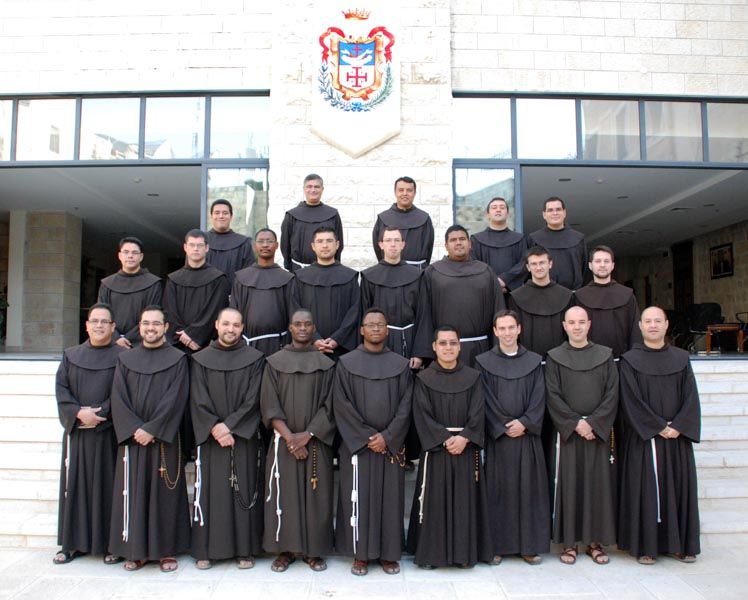At Saint Savior’s Monastery, which belongs to the Custody of the Holy Land, it is not uncommon to come across young friars. There is a reason for this: the headquarters of the Franciscans not only welcomes the administrative activities of the Custody of the Holy Land, but it is also an international seminary. How does this important part of the Custody operate? To understand this, you must start from its international character. There are 33 students, hailing from thirteen countries and they all have different languages and cultures. They usually spend four years studying theology and they come after a path of study which varies according by their country of origin, but which provides vocational discernment, postulancy, novitiate and study of philosophy. The seminary’s mission is to provide Franciscan formation, both biblical and theological, in the Holy Land, and an experience of the fraternal life at St. Savior’s Monastery in Jerusalem, of the specific mission of the Custody at the sanctuaries and of its love for the holy places. Those who choose clerical life are prepared for priestly ordination. “But the first vocation for us Franciscans is to be friars,” said Br. Oscar, dean of the international seminary.
The seminarians are in contact with different mentalities and behaviors, but the life they lead is the same for each one of them. The alarm rings at 5:45 a.m. for their 6:15 a.m. appointment with praises and mass. Their five hours of classes begin at 8:00 a.m., each one of which is 45 minutes long. Course topics include sacraments, the Holy Scriptures morals, Latin, Greek, the major and minor prophets and St. Paul’s letters. Midday prayer occurs at 12:30 p.m., followed by lunch. From then on, the day changes depending on the commitments and the individual activities of the friars. There is song practice, the Lectio Divina, service at the Holy Sepulcher, for example. “Our tasks as friars are different because they relate to the person, not a group, “ explained Br. Eduardo, the student representative. “We are not trained as soldiers in the barracks and that is the greatest thing about the seminary. The gifts of the individual are identified and they are used to serve the community.” One might work as a tailor, one as a driver, one as a barber or one might be active in the guitar singing group. In the evenings, we come back together for Vespers and dinner.
Br. Donaciano Paredes Rivera, a seminary professor, is having to manage a diverse environment from a cultural standpoint and from the perspective of the seminarians’ previous formations. “Since there are student friars from various Franciscan provinces from all over the world, it is not easy to combine their multiple paths of study into a single formation curriculum,” said Br. Donaciano. “This always means we have to start at our formation house, because every year, we gain about ten new elements.” His job as a professor is guiding the formation and discernment of the students and accompanying the academic performance of the theology students who have made their solemn vows. One of the aspects that is focused on, according to Br. Donaciano, is trying to grow “the capacity for openness and co-existence, by accepting the others’ differences, knowing that this is an opportunity afforded to us by Providence to enrich one another. It means accepting others without closing oneself off to one’s own personal patterns, and to be free in encountering one’s brothers and the people that we meet.”
Among the difficulties encountered in the international seminary, one of the most common is the language barrier because the lingua franca of the Holy Land Custody is Italian. Many friars, in fact, especially at the beginning of the year, are not fluent in Italian and it therefore takes them longer to communicate. Also homesickness can be an issue, especially with seminarians who come from countries that are at war, for example. Br. Oscar did however explain that if one is sure of one’s choice, fears or difficulties can be overcome. “I knew I’d be in this part of the world for five years,” explained the friar originally from Mexico. “I do not know when I will go home or if something will happen to my family. This could be my biggest fear, but it is not because I am aware (and my family is too) that I have made a choice for my life and I am happy with this choice. So, there is no nostalgia. I share my joy of being friar in the Holy Land with them.” His job is as dean is working with the professor and the assistant professor to help them organize the monastic life of the friars. The task “is always carried out as a service and not as a privilege,” said Br. Oscar.
Br. Eduardo, the student representative, also spoke about positive and problematic aspects, “It is wonderful to share other people’s culture, but it is also very complicated.” His role as a moderator between the needs of pupils and teachers has led him to be aware of different sensitivities. Br. Eduardo is also the assistant master of ceremonies and he, therefore, carries out this service during the celebrations. “Here in the Holy Land, I am very happy because I personally feel drawn to the international character [of the seminary] and this is one of [its] most beautiful aspects,” said the friar.
On the subject of why it is important to study theology, Br. Donaciano clearly explained, “I learned that theology, which has the Holy Scriptures at its core, nourishes our faith and its fundamental purpose is to present the wisdom of Revelation and the content of the faith.” In this way, the friar will have a way to help them reach a solid and deep understanding of the faith and what will be favored will be “a great and living love for Jesus Christ, for the Church and for all creatures,” said Br. Donaciano.
Beatrice Guarrera, Custodiae Terrae Sanctae


